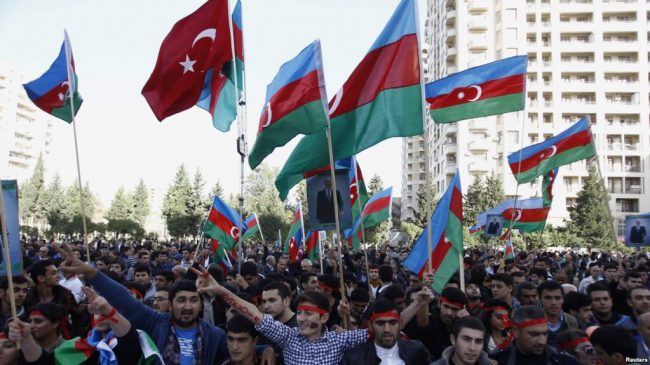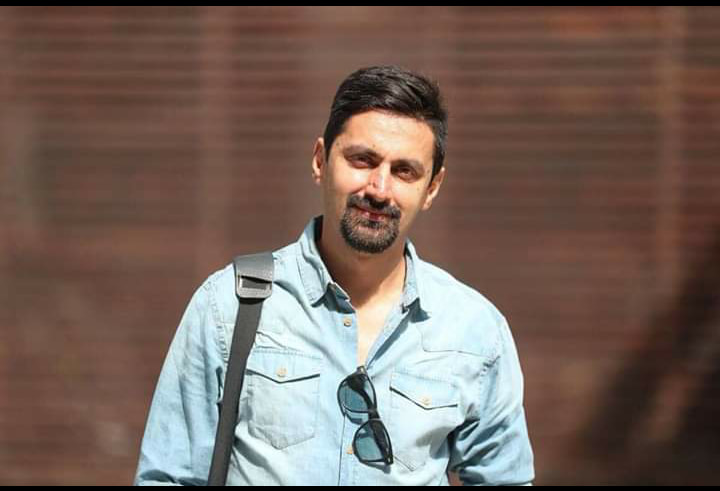
 Nearly five years after the Azerbaijani government began a renewed crackdown on dissenting voices, the environment remains hostile for opposition parties. The authorities create the semblance of a multi-party system by financing political parties whose role is to function as the opposition while maintaining the status quo. Some fear that suppressing genuine opposition and excluding it from the political arena will lead to more radical forms of activism, which could ultimately be damaging for the state.
Nearly five years after the Azerbaijani government began a renewed crackdown on dissenting voices, the environment remains hostile for opposition parties. The authorities create the semblance of a multi-party system by financing political parties whose role is to function as the opposition while maintaining the status quo. Some fear that suppressing genuine opposition and excluding it from the political arena will lead to more radical forms of activism, which could ultimately be damaging for the state.
Political arrests are still common in Azerbaijan. According to human rights activists, around 150 political prisoners are currently being detained in the country, and at least one new person is imprisoned for political reasons every month.
Last month, Saleh Rustamov was arrested. Although officially charged with drug offences, the real motive behind his arrest has been speculated to be his alleged financial support of the opposition Azerbaijani Popular Front Party. Rustamov was the head of the Gadabay regional administration during the the Popular Front government in 1992–1993. Following his arrest, three party activists from the Azerbaijani Popular Front were also taken into custody. Official information confirmed that these arrests were for the alleged financing of the opposition.
Following a peaceful rally organised by civil society groups on 28 May to mark the 100th anniversary of the founding of the Azerbaijan Democratic Republic, a Member of Congress from the Republican Alternative Party, Azar Gasimli, and three other party members were arrested.
Legal arbitrariness
Human rights activist Annaghi Hajibayli says these arrests are a show of legal arbitrariness. According to him, they are used to intimidate activists and political parties who do not follow the government line.
Natig Jafarli, a member of the congress of the opposition Republican Alternative Party (REAL), says the main reasons for the recent arrests lie in the authorities’ fear following a wave of protests in Azerbaijan’s neighbours. This, Jafarli tells OC Media, has led to a greater fear in society, as the authorities take measures ‘aimed at preventing society from organising itself in protest’.
Ali Karimli, the chairman of the Popular Front Party of Azerbaijan, says the government has been trying for many years to undermine genuine opposition parties. According to him, opposition parties have been unable to function properly for years due to the restrictive political environment. Frequent propaganda campaigns are used against them.
‘We have been deprived of the opportunity to engage in political activity. Moreover, our party’s deputy chairpersons and advisers are currently held as political prisoners. Almost half of the party’s board members are either prisoners or political exiles. At present, 16 members of the party are in jail’, Karimli told OC Media.
Karimli notes that since 2016, every time the party has held a rally, participants were arrested.
‘After the rally on 11 September 2016, the participants were arrested. We held eight more rallies after that. During these, 500–600 party activists were called down to the police station and threatened. Eighty-two people were placed in administrative detention. More than 30 party officials were dismissed from their jobs’, Karimli said.
Political commentator Nasimi Mammadli says that those who have joined opposition parties in recent years have faced severe repercussions.
‘These people and their relatives get fired from their jobs, their relatives are forced to renounce them, they get imprisoned on false charges, and they’re exposed to extreme discrimination. The absence of a free press, coupled with the government’s full control over the country’s economic and political resources, including the courts and law enforcement agencies, has seriously damaged the democratic institutions and multilateral political systems in the country’, Mammadli told OC Media.
Mammadli states that after the 2002 constitution referendum, the country’s legislation underwent considerable changes that restrict the rights and obligations of political parties. In total, 58 amendments to the Law on Political Parties were made at different times. As a result of the restrictions imposed through these legislative changes, the role of political parties within the state has been significantly diminished.
According to Mammadli, the mechanism for financing political parties is also regulated by the legislation, meaning the government effectively has administrative control over parties. Political parties are prohibited by law from receiving donations from abroad. There are also limitations and obstacles to receiving donations from individuals, and cash donations are prohibited. If a political party has representation in parliament, it can access state funding. In practice, however, this means that genuine opposition parties are excluded from funding, as they are not represented in parliament.
‘Opposition parties fall outside these arrangements because their [lack of] representation in parliament is not determined by democratic elections, but by the political will of the authorities. At the same time, repressive policies against them are employed by state agencies’, Mammadli says.
‘Opposition’ parties of the government
According to Mammadli, some parties, both ostensibly oppositional and openly pro-government ones that defend the interests of the government also receive illegal state funding. They have offices, pay salaries to party workers, and are under the political and legal guarantee of the government.
‘Such parties serve the triumph of authoritarianism, not pluralism in the country. The authorities have been manipulating the political system for many years to make it appear as if there are more candidates representing the opposition. They spend huge amounts of money on false alternatives because this is a proven method of confusing society into believing that the country has reached political maturity’, Mammadli tells OC Media.
According to human rights activist Annaghi Hajibayli, the law on political parties clearly indicated that all parties should be financed from the state budget, but this was later restricted to partial funding of those parties who had won seats in parliament.
‘In fact, according to the Constitution and another article of the law on political parties, the state must create equal conditions for all political parties. And it should create an environment that facilitates their operations. But the New Azerbaijan Party has dozens of branches in Baku alone, whereas most political opposition parties don’t have any offices in Azerbaijan at all. As a major opposition party, the Popular Front is one of the largest and most active political parties in the country. Nevertheless, it has no headquarters. Where is the equality in the political environment here?’ Hajibayli says.
Hajibayli says state restrictions on funding are driving opposition parties to obtain financing outside the existing legal channels because they have no other option.
‘Opposition political parties don’t receive financial support from the state budget. Donations are forbidden. No businessman can finance an opposition party because he would be bankrupted immediately through administrative mechanisms. As a result, the state is pushing political parties to finance themselves illegally [with cash donations or money from abroad]. A party may break the law by accepting an illegal donation — but the state is really to blame [for creating this problem]’, Hajibayli said.
Nasimi Mammadli states that, in parallel to the legal restrictions, the authorities do not allow opposition parties any room to function operationally. ‘Opposition parties in the country mostly operate without a headquarters and without financing. In general, political activity outside the cities is informally banned, so most parties have to operate there secretly’, he says.
Nominal plurality
Ali Karimli, the chairman of the Popular Front, told OC Media the party is functioning on a semi-legal basis. According to him, police intervene at meetings held by opposition parties outside the cities.
‘We tried twice to rent a private office to use as our headquarters. Without any court order, without any explanation, the police came to the building and welded the doors shut. The second time, they threatened the proprietor, [telling him] to break the contract with us. [They said that] if the contract were not broken, the building may “catch fire”. After the proprietor published that conversation, the headquarters was bombed ’, Karimli told OC Media.
There are currently 55 registered political parties in Azerbaijan. Political commentator Nasimi Mammadli states, however, that there is no multi-party political system in the country. The chairman of the Popular Front, Ali Karimli, also thinks that plurality is only nominally provided.
‘Most of the registered parties don’t actually operate. The names of all the [inactive] parties are nevertheless visible on the registry at the Ministry of Justice’, Karimli said.
Ali Karimli links the inactivity of these parties to the government attacks on real opposition parties.
‘Other parties have shown that if you function as the opposition, your members will be fired, prosecuted, and imprisoned’, said Karimli.
Opposition parties belong in the ‘dustbin of history’
Active parties considered genuine opposition by the authorities are often presented as radical or unpatriotic. In a speech at his recent inauguration, having been elected for a fourth term for seven years, President Ilham Aliyev condemned these opposition parties.
‘They do not have a place in the political scene of Azerbaijan. The people of Azerbaijan have long determined their place, and this is in the dustbin of history’, Aliyev said.
Member of the Azerbaijani Parliament and Deputy Executive Secretary of the New Azerbaijan Party (YAP), Siyavush Novruzov, accused the opposition of taking an ‘anti-Azerbaijani position’ while commenting on the recent arrests to local media.
‘They carry out their orders against Azerbaijan from separatist forces, with financial support from the Armenian lobby’, Novruzov said.
The General Prosecutor’s Office and the Ministry of Internal Affairs released a statement on the recent arrests accusing the Popular Front of fraud worth up to half a million dollars.
The chairman of the Democratic Party of Enlightenment, MP Elshan Musayev, told local media that there is a need for a new opposition.
‘A new opposition should grow in Azerbaijan. There should be a level of intellectual opposition that we can sit at one table with’, Musayev said.
Natig Jafarli from the REAL party says that even if the moderate and secular opposition is completely abolished, the government’s problems will not disappear.
‘This environment will lead to radical and marginalised currents, civilised political struggle will be replaced with radicalism, and this will damage our country. Above all, the government should not want that to happen, but the steps the government is taking will create exactly that’, Jafarli told OC Media.




 11 July 2018
11 July 2018




